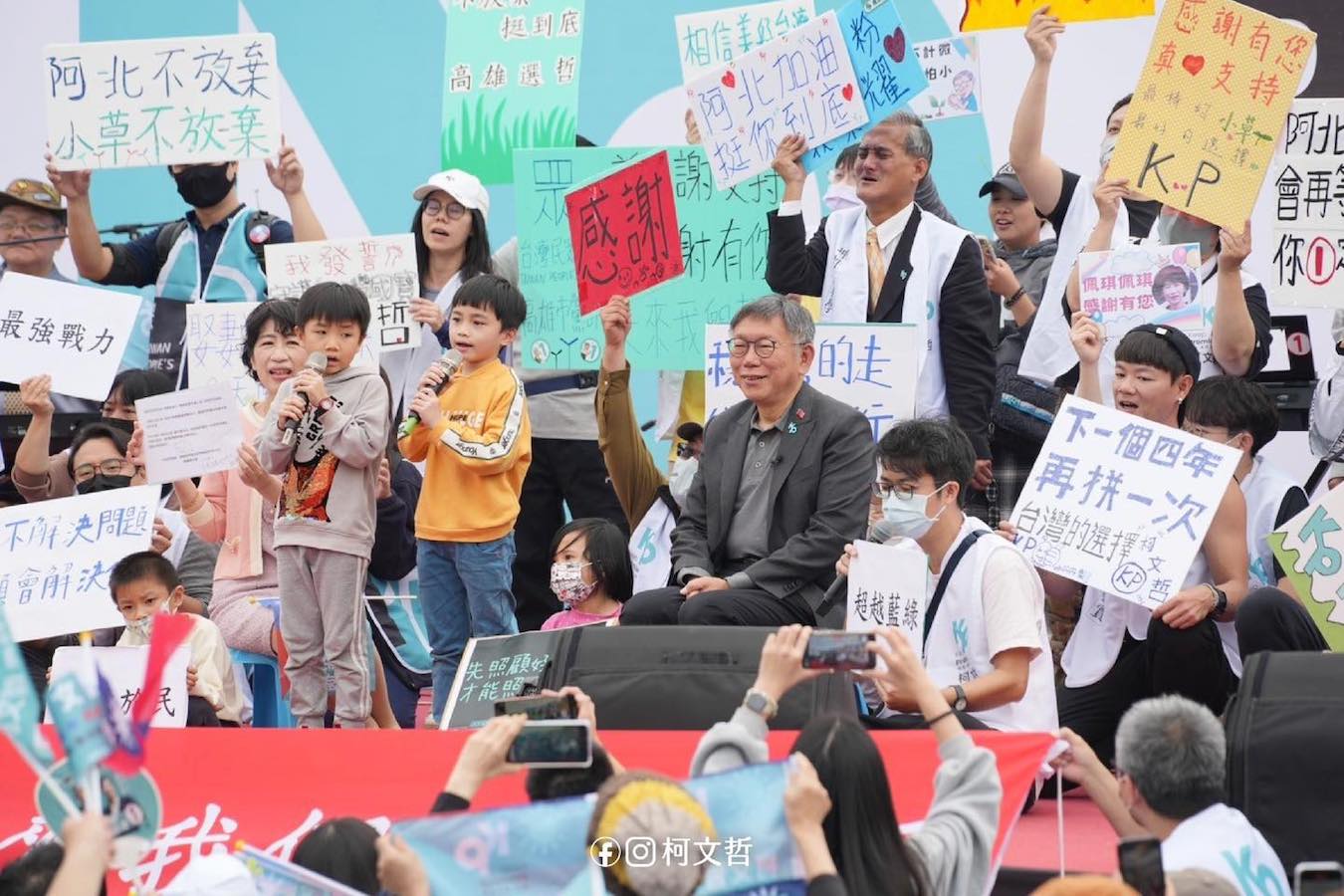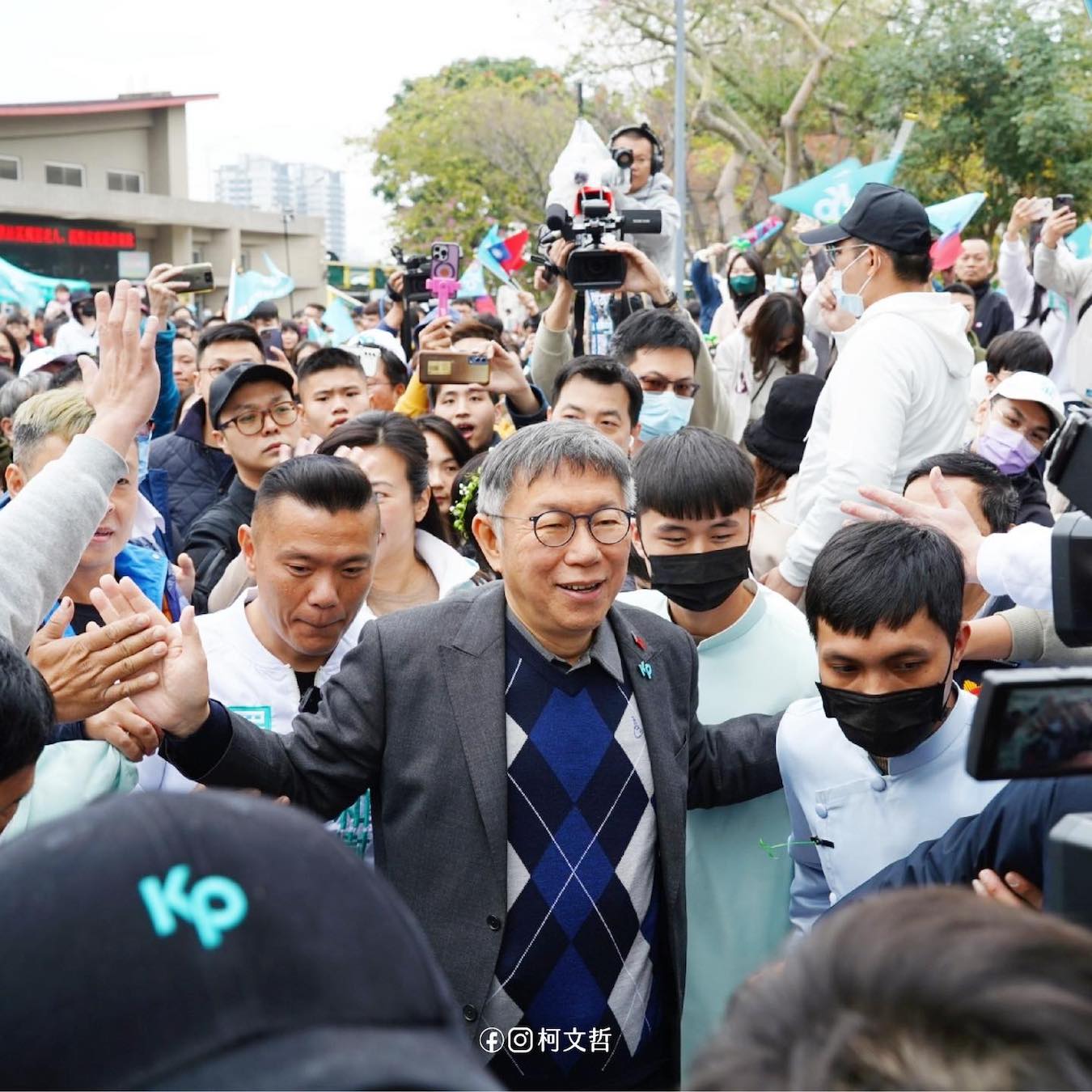by Brian Hioe
語言:
English
Photo Credit: Ko Wen-je/Facebook
YOUNG SUPPORTERS OF Ko Wen-je’s TPP have recently been criticized as “cult-like” after videos of high schoolers selling “Little Grass ID cards.” The ID cards are sold for 500 NT each, leading to criticisms of the TPP that it is brainwashing children and that it is seeking to raise money in the manner of a direct sales scam.
“Little Grass” is a term used among young TPP supporters to refer to themselves. This is visible in TPP rallies, where supporters often wear grass headwear.
That being said, videos of high schoolers selling “Little Grass ID cards” are of unknown origin. Ko himself stated that he was not sure if the videos were faked or not. It is not impossible that political groups antagonistic to the DPP have sought to amplify the image of the TPP as cult-like and the young supporters of the TPP as simply caught up in the political craze.
 Ko Wen-je and supporters. Photo credit: Ko Wen-je/Facebook
Ko Wen-je and supporters. Photo credit: Ko Wen-je/Facebook
The self-labeling of TPP supporters as “Little Grass” reflects how the TPP has branded itself as the party of regular, everyday people. Its politicians are cast as different than slick and polished members of the political establishment, with Ko’s frequent gaffes–even forays into misogyny and homophobia–serving to illustrate this fact. This a way in which Ko’s misstatements and fumbles on the national stage, including his failed negotiation on a joint ticket with the KMT, add to his image as an everyman among supporters.
This proves ironic, seeing as the DPP previously embraced grass imagery in the aftermath of the 2014 Sunflower Movement, as part of efforts to encourage young people to run for lizhang and other grassroots political positions. More generally, one sees how young TPP supporters draw from both blue and green iconography and political framings in their stances–TPP rallies on the eve of the election referenced both former president Ma Ying-jeou of the KMT and former president Chen Shui-bian of the DPP in a positive light.
Ko has sometimes been labeled a populist politician, in that he shrugs off easy categorization by unpredictably shifting between traditionally blue and green positions. To this extent, populist appeal serves to explain why Ko’s gaffes or stumbles do not seem to significantly impact his political image.
That many young people are perceived as supporting Ko is another phenomenon that has resisted analysis. Namely, poll after poll continues to show that Taiwanese identity is still on the rise, while Chinese identity and identifying as both Taiwanese and Chinese simultaneously is on the decline. This does not seem to mesh with the fact that Ko has called for restarting trade talks over the Cross-Strait Services Trade Agreement, the controversial trade pact that sparked the 2014 Sunflower Movement, and even building a bridge between Kinmen and Xiamen. Likewise, Ko’s public statements that he did not support the legalization of gay marriage clashes with how polls also show support for gay marriage among young people.
In this light, it would not be surprising if Ko develops a mass following, inclusive of followers embracing a distinctive political identity of their own such as that of the “Little Grass.” This also was the case with previous Taiwanese presidents of either political persuasion, such as Chen Shui-bian or Ma Ying-jeou, who took power promising change. At the same time, this is not to say that current supporters of Ko could not later grow disillusioned with him, as supporters of Chen and Ma also did.
 Photo credit: Ko Wen-je/Facebook
Photo credit: Ko Wen-je/Facebook
Indeed, disdain for the “Little Grass” may dismiss that this reflects a desire for change. No doubt, to pan-Blues, the 2014 Sunflower Movement must have also seemed cult-like in terms of its actions and political iconography.
Yet identity trends being what they are, one does not expect young people to forever follow Ko, particularly when events throw his political views into sharper relief. Furthermore, one notes that Ko’s party, the TPP, suffers the inherent constraint on its growth that its political future remains closely linked to Ko’s career. It is likely that some event down the line perhaps eventually alienates Ko from his young supporters.
One notes that before the outbreak of the Sunflower Movement–an event that is distant history for members of Gen Z–Millennials were also derided as a soft and apolitical generation. The eruption of the Sunflower Movement served to change such perspectives. This, too, could be the case with today’s young.

